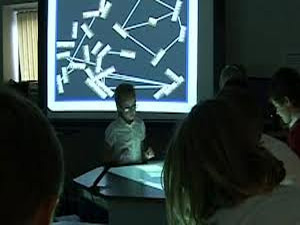



Date:26/11/12
 Interactive hi-tech desks could help boost the maths skills of primary school pupils, researchers have said.
Interactive hi-tech desks could help boost the maths skills of primary school pupils, researchers have said.
The multi-touch, multi-user interactive 'smart' desks were designed, built and tested by Durham University, the BBC reported.The desks help children work together without any one individual dominating, the three-year project involving 400 children aged eight to 10 suggests.
Researchers said high costs mean the desks are "some way off" being a regular feature in schools.
However, they said they have already found a number of ways of reducing the cost of the technology.
Researcher Emma Mercier said the desks help pupils "find a range of solutions to arithmetic questions".
They act like multi-touch interactive white boards so that several students can use any desk at once.
This makes it is easier for students to collaborate on finding solutions to problems, according to the study, published in the journal Learning and Instruction.
Mathematical 'flexibility'
The classroom teacher gets a live feed of the desks and can intervene if any pupil needs help.
The researchers claim the desks can encourage pupils to use their mathematical skills to solve problems more effectively than traditional practice on paper.
"We can achieve fluency in maths through practice, however, boosting a pupil's ability to find a range of solutions to arithmetic questions is harder to teach.
This classroom can help teachers to use collaborative learning to improve their pupils' flexibility in maths," said Dr Mercier.
"Co-operative learning works very well in the new classroom because pupils interact and learn in a different way. The children really enjoy doing maths in this way and are always disappointed when you turn the desks off," she added.
Interactive school desk 'boosts maths' claims research
 Interactive hi-tech desks could help boost the maths skills of primary school pupils, researchers have said.
Interactive hi-tech desks could help boost the maths skills of primary school pupils, researchers have said.The multi-touch, multi-user interactive 'smart' desks were designed, built and tested by Durham University, the BBC reported.The desks help children work together without any one individual dominating, the three-year project involving 400 children aged eight to 10 suggests.
Researchers said high costs mean the desks are "some way off" being a regular feature in schools.
However, they said they have already found a number of ways of reducing the cost of the technology.
Researcher Emma Mercier said the desks help pupils "find a range of solutions to arithmetic questions".
They act like multi-touch interactive white boards so that several students can use any desk at once.
This makes it is easier for students to collaborate on finding solutions to problems, according to the study, published in the journal Learning and Instruction.
Mathematical 'flexibility'
The classroom teacher gets a live feed of the desks and can intervene if any pupil needs help.
The researchers claim the desks can encourage pupils to use their mathematical skills to solve problems more effectively than traditional practice on paper.
"We can achieve fluency in maths through practice, however, boosting a pupil's ability to find a range of solutions to arithmetic questions is harder to teach.
This classroom can help teachers to use collaborative learning to improve their pupils' flexibility in maths," said Dr Mercier.
"Co-operative learning works very well in the new classroom because pupils interact and learn in a different way. The children really enjoy doing maths in this way and are always disappointed when you turn the desks off," she added.
Views: 1075
©ictnews.az. All rights reserved.Similar news
- Mobile operators of national market to reduce roaming tariffs
- Iran vows to unplug Internet
- China Targeting Telecoms in Corruption Probe
- Bangladesh to use electronic voting system for next elections
- Philippine IT sector to launch five-year digital strategy plan
- Russian Premier Vladimir Putin meets ITU Secretary-General Hamadoun Touré
- US lawmakers propose to regulate use of geolocation data
- Unlimited mobile data plans dying as telcos gear up for cloud future
- Europe at risk of falling behind US and Asia on 4G use
- Netherlands first to regulate on net neutrality
- Korean Co Takes Aim At Display Patents
- Regulators, Banks Look for IT Hires After Breakdowns
- Electron transactions spreading
- Schools in remote rural areas will connect to the single database via network without SIM
- Obama to Personally Tweet From Twitter Account





















